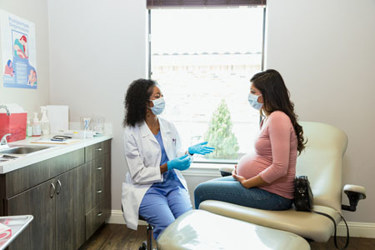Moderna Addresses Awareness Gap, Builds Community Trust To Boost CMV Trial Recruitment
By Lori Panther, MD, VP of clinical development, infectious diseases, Moderna

When it comes to dangerous infectious diseases in pregnancy, the most well-known example is Zika — the mosquito-borne illness that can lead to birth defects in 5%-15% of all babies exposed in utero — despite the fact there are currently no outbreaks in 2023 and most women are unlikely to be exposed.
Yet, a recent survey found fewer than one in four Americans are aware of the leading cause of pediatric birth defects — a highly common and contagious viral infection known as cytomegalovirus, or CMV. And only 17% of healthcare providers report talking about it with their patients.
Why does this matter? Awareness can be a driving force in clinical research. For example, the 2015-16 Zika outbreak was so highly publicized that it spurred dozens of pharmaceutical and public health entities to begin testing vaccine candidates against the virus. By comparison, CMV research has been relatively stagnant.
In an age where people who are pregnant are screened for hundreds of genetic mutations but are not screened for CMV, are not made aware of the risks, and have limited preventive options, healthcare providers must take an active role in educating new parents about CMV, and we, as clinical researchers, need to play an active role in designing trials that reflect the communities impacted by this virus.
Who Is Most Affected By CMV, And What Are The Repercussions?
By age 40, more than half of all people in the U.S. have become infected. Pregnant people with young children in daycare or classroom settings have a higher risk of contracting CMV, as the virus spreads quickly by direct contact with infectious body fluids. CMV also disproportionally affects racial and ethnic minority communities, including Latinx and African Americans, as well as those with a lower socioeconomic status.
While a first-time CMV infection can cause mild flu-like symptoms and poses a minor risk for healthy adults, the same cannot be said for babies in utero. If someone becomes infected with CMV while they are pregnant, they can pass the infection to their unborn baby and cause devastating health challenges.
The impact of a CMV infection in utero can be dire, including congenital hearing loss, seizures, developmental delays, and even death. Each year, more than 30,000 babies are born with congenital CMV, with 20% of these babies experiencing lifelong effects.
What Are Health Experts Doing To Stop CMV?
Given the lack of public discussion about CMV, many nonprofits, research institutions, and advocacy organizations, like the National CMV Foundation, are working to raise awareness about the disease to promote greater understanding and further research.
There is also work in progress to create a preventive tool to limit CMV’s impact. While researchers have previously struggled to develop a viable vaccine with traditional technologies, Moderna is conducting clinical trials to evaluate a first-of-its-kind CMV vaccine candidate that leverages the same mRNA platform that created its COVID-19 vaccine.
How Did Moderna’s COVID Work Inform Its CMV Approach?
What many people might not realize is CMV has long been a priority for Moderna, and our work on that vaccine began long before the COVID-19 pandemic. In fact, learnings from CMV and other programs helped us to research and deliver Spikevax (COVID-19 vaccine, mRNA). Our investigational CMV vaccine leverages the same mRNA platform as Spikevax, composed of six mRNAs encoding the CMV pentamer complex and gB antigens together into one vaccine.
Because of the COVID-19 pandemic, we learned that enrollment in clinical trials is best done at the point of care. So, we partnered with pharmacists at both large retail and smaller community-based clinics to meet people where they were, allowing us to extend critical access to our trial in medically underserved areas and among racial and ethnic minority communities. These partnerships enabled us to conduct very targeted and personalized outreach among patient groups, whose prescription needs mirror those who are eligible to participate in our trials.
In partnering with local pharmacies and clinics, we leveraged the very personal and trusting relationships that individuals have built with their pharmacists to remove some of the logistical burdens of clinical trial enrollment, including trial awareness, enrollment eligibility, and finding and accessing the nearest participating trial locations. We also offered childcare vouchers for parents to address the socioeconomic concerns of clinical trial participation and are partnering with organizations like Care.com and Urban Sitter, which is particularly important for traditionally underrepresented populations who are disproportionately impacted by CMV.
What Challenges Remain With Trial Enrollment?
CMV awareness among patients and the provider community continues to be our biggest barrier for clinical trial enrollment. Overall research on CMV has been limited due, in part, to the need to enroll women in clinical trials who are serostatus negative for CMV antibodies — a particular challenge when more than half of the population has been unknowingly infected.
It was important for us to establish a base understanding of the CMV landscape as we initiated Phase 3 of our CMV vaccine trial. As such, we partnered with Harris Poll to root our efforts in data and analytics and learned 93% of healthcare providers agree that universal newborn screening would be beneficial to determine the general prevalence of asymptomatic congenital CMV. We learned how to not only educate the general public but also our trial site investigators about CMV. According to our Harris Poll results, nearly half of surveyed healthcare professionals (HCPs) hesitate to discuss CMV, citing concerns of fearmongering among their patients. The same poll also revealed 91% of HCPs believe they would benefit from coaching or training to better discuss CMV with their patients. This desire for additional training on the HCP side reflects the wish for greater disease education/information among patients, as more than 80% of surveyed consumers said they want to learn more about CMV from a medical professional.
As some of the most trusted sources of healthcare information for their patients, particularly expectant parents, arming HCPs with information and the latest in clinical research will be a crucial element of advancing CMV disease education.
What Can Industry Do To Eliminate Barriers To Clinical Trial Participation?
As an industry, we must do a better job at meeting patients where they are and have our messages come from people they trust. When considering a clinical trial site, it is important to build partnerships with organizations that have already built trust in their communities. Our partnerships with local and national health organizations and community groups, including BlackDoctors.org, Black Health Matters, the YWCA, and the National CMV Foundation, have allowed us to tap into a network of expert and trusted allies who can help share information about the burden of CMV in a way that resonates with those who require it most, without fearmongering. We also need to be transparent about our diversity recruitment goals and offer compensation and incentives that have, when absent, hampered participation.
We can even take it one step further — by taking our efforts to the streets. We have partnered with local and national health organizations to dispatch mobile units to underrepresented and more rural communities to provide healthcare and educate people about the importance of clinical trial representation and participation. These mobile units simultaneously offer access to basic health checkups while giving people an opportunity to learn more about opportunities to participate in our clinical trials, leading to a win-win for both trial recruitment and community health.
The clinical research on CMV continues to evolve. There is still work to be done, but we are confident that by implementing small changes in our clinical trial recruitment efforts we, and the industry, can drive change and break down barriers.
About The Author:
 Lori Panther, MD, MPH, is the vice president of clinical development, infectious diseases at Moderna. She is board-certified in internal medicine and infectious diseases. Prior to joining Moderna, Panther served as associate director for clinical research at The Fenway Institute in Boston.
Lori Panther, MD, MPH, is the vice president of clinical development, infectious diseases at Moderna. She is board-certified in internal medicine and infectious diseases. Prior to joining Moderna, Panther served as associate director for clinical research at The Fenway Institute in Boston.
Panther received her MD from the University of Iowa School of Medicine and completed her training in internal medicine at the University of California at San Francisco Medical Center. She completed her training in infectious diseases at the University of Washington Medical Center and received her MPH from Harvard School of Public Health.
